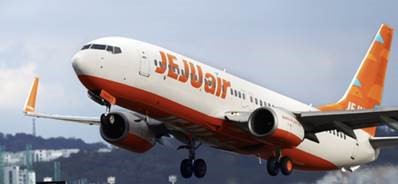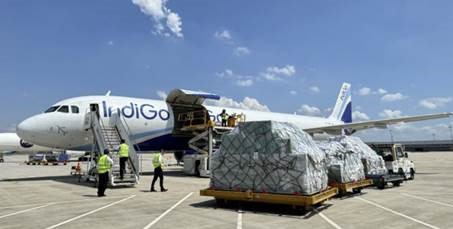EXTRANS GLOBAL - Air Freight News - Week 52 2024
Air Cargo General
1) Asia-Pacific market leading the global parcel market - Expected to grow at an average annual rate of 7.5% until 2028

- The global parcel market, which has shown steady growth since 2020, is led by the Asia-Pacific region.
- Recently, Transport Intelligence (Ti), a logistics market research firm, reported that the global parcel market has recorded an average annual growth rate (CAGR) of 5% from 2020 to the present. The market size in 2020 was approximately €449 billion ($470.7 billion), and it surged to €594 billion in 2021 due to a massive increase in online shopping demand worldwide.
- Although the growth temporarily slowed in 2022, a recovery was observed in 2023, with expectations for a 5.1% growth in 2024, bringing the market size to €545 billion.
- Ti attributes this growth to an increase in e-commerce activities and a rising demand for efficient logistics solutions, noting significant regional differences in growth rates.
- In particular, the Asia-Pacific market holds the largest share of the global parcel market in value terms, with a forecasted growth of 7.7% in the regional express and parcel market this year. In contrast, North America and Europe are expected to see growth rates of only 3.2% and 3.5%, respectively.
- Consequently, Ti predicts that the Asia-Pacific region will record the highest growth rate in the global parcel market, with an average annual growth rate of 7.5% until 2028.
- In fact, DHL Express reported a 6% increase in cargo volumes traveling between the Asia-Pacific region and the rest of the world from the first to the third quarter of this year compared to the same period last year.
2) Chinese airlines and forwarders are increasing contracted freight rates - driven by e-commerce and general cargo demand

- Chinese airlines are reportedly taking advantage of the ongoing peak season in December to raise contracted freight rates for 2025.
- According to the latest market report from Dimerco, which provides active services in the China-Taiwan market, airlines are implementing rate increases of about 10% on long-haul and intra-Asia routes.
- In fact, local forwarding sources in Shanghai agree with this assessment, noting that the block space contract price from Asia to Europe has risen by $1.4/kg.
- While the extension of the peak season seems to be limited at least to demand from China, it is expected that e-commerce demand will continue to grow until early January, before the inauguration of President Trump.
- Notably, in addition to e-commerce demand, there has been a steady shipment of general cargo by air, which is also cited as a reason for the recent peak season extension. This is attributed to shippers of general air cargo adjusting their release dates to avoid high rates during the surge in e-commerce demand in October and November.
- Dimerco has also reported that, separate from e-commerce demand, there is an influx of general air cargo related to electronics in December. Furthermore, the trend of general cargo optimizing capacity and costs by avoiding the e-commerce peak season in October and November suggests that this could become a new trend in the air cargo market in 2025.
- This contrasts with the traditional slowdown of the air cargo market in December, leading many experts to predict that this year's peak season will last until the end of January, just before the Chinese New Year.
- Meanwhile, due to the high freight rates in the local Chinese market, there is an expectation that transshipment demand through Incheon Airport, which has competitive advantages in terms of supply and rates, may also rise.
3) Attention is focused on the 'role of LCC restructuring' by Jeju Air and Daemyung Sonoh, as their M&A activities show a reasoned and moderate approach

- The integration of Korean Air and Asiana Airlines is causing noticeable changes in the low-cost carrier (LCC) industry.
- As low-cost airlines within the integrated Korean Air framework are consolidated into a large low-cost airline, other low-cost carriers will have a stronger incentive to pursue mergers and acquisitions to achieve economies of scale.
- Jeju Air and Daemyung Sonoh Group are particularly noted for their potential key roles in the M&A market within the low-cost airline sector. However, considering external environments and internal circumstances, both parties are likely to find it difficult to hastily pursue significant transactions.
- The three low-cost airlines under integrated Korean Air (Jin Air, Air Busan, and Air Seoul) are coordinating schedules and plans for integration, working towards establishing a unified low-cost airline.
- In the aviation industry, increasing scale, expanding networks, and enhancing market share are key factors for competitiveness. The integrated low-cost airline will have favorable conditions to secure a competitive advantage.
- Jeju Air and Daemyung Sonoh Group are seen as strong candidates for potential mergers and acquisitions in the LCC sector, with both hinting at their intentions for M&A.
- Kim Yi-bae, CEO of Jeju Air, expressed the importance of readiness for future M&A opportunities in a message to employees in June, stating, “While we cannot know the timing for recovering investments from private equity funds, how we respond when M&A opportunities arise is crucial.”
- Daemyung Sonoh Group has recently secured stakes in T’way Air and Air Premia, raising discussions about its potential entry into the aviation industry. Officially, they claim this is merely for synergy between their existing accommodation and leisure businesses and the airline industry, without intent to acquire management rights in the two airlines.
- However, there are concerns that both Jeju Air and Daemyung Sonoh Group have many considerations to address before making significant bets.
- Jeju Air urgently needs to secure cash rather than pursue mergers and acquisitions to enhance competitiveness in the aviation industry at this time.
- Many believe that Daemyung Sonoh Group could face challenges in acquiring both airlines, as both T’way Air and Air Premia are managed by their largest shareholders, not private equity, and entering the difficult aviation sector as a new player could lead to significant risks.
- Some speculate that Daemyung Sonoh Group might first acquire Air Premia to gain experience in the aviation industry before targeting management rights in T’way Air.
- However, the largest shareholder of Air Premia, AP Holdings (Tire Bank Group), has shown a strong commitment to maintaining its management rights.
4) The Indian air cargo market is expected to thrive next year, with positive demand growth for both airlines and forwarders

- The Indian air cargo market, which has been recognized for having a successful year due to a surge in demand, is expected to continue its growth next year, driven by increasing e-commerce demand and expansion in the manufacturing sector.
- Airlines, which are leading the global air cargo market, as well as forwarders, unanimously express positive and optimistic outlooks for the Indian air cargo market.
- Local market analysis firms in India predict that the volume of air cargo in India will reach between 3.6 and 3.7 million tons in the fiscal year 2024-25, representing a 911% increase compared to the previous year. They emphasize that, based on the rapid growth of e-commerce, India aims to handle 10 million tons of air cargo annually by 2030.
- Similar to airlines, market participants, including cargo forwarders, also forecast a positive outlook. As airlines address the increase in demand by improving operational efficiency and innovation, forwarders expect sufficient conditions to maintain profitability.
- In particular, forwarders anticipate that the new Navi Mumbai International Airport will inject new vitality into the Indian air cargo market. The new airport is expected to resolve congestion issues at the existing Mumbai airport and facilitate smoother logistics flows, thanks to its strategic location and advanced infrastructure.
5) GSA and Airline Trends
- PAA - Contracted with Hong Kong Air Cargo (RH) for GSSA starting January 1, 2025. Daily operations of 2 HX flights from ICN to HKG.
Cargo services from HKG to MNL/TPE, and cargo service to YVR in the second half of next year.

top



